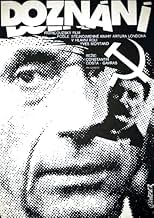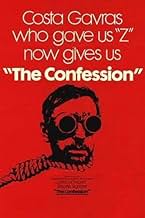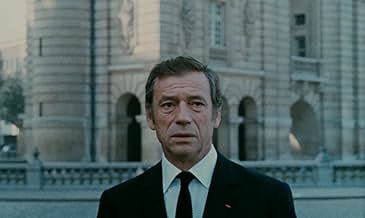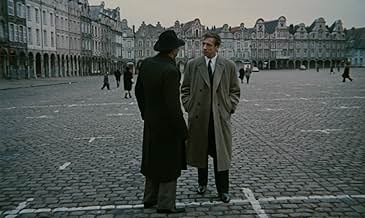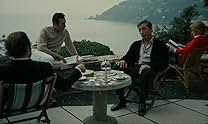CALIFICACIÓN DE IMDb
7.8/10
5.1 k
TU CALIFICACIÓN
Anton Ludvik es el viceministro de Asuntos Exteriores de Checoslovaquia. Un día, lo arrestan y lo encarcelan en confinamiento solitario. Se nos muestran las torturas mentales para lograr que... Leer todoAnton Ludvik es el viceministro de Asuntos Exteriores de Checoslovaquia. Un día, lo arrestan y lo encarcelan en confinamiento solitario. Se nos muestran las torturas mentales para lograr que un funcionario confiese traición.Anton Ludvik es el viceministro de Asuntos Exteriores de Checoslovaquia. Un día, lo arrestan y lo encarcelan en confinamiento solitario. Se nos muestran las torturas mentales para lograr que un funcionario confiese traición.
- Dirección
- Guionistas
- Elenco
- Nominada a1 premio BAFTA
- 3 premios ganados y 3 nominaciones en total
Opiniones destacadas
Anton Ludvik, aka Gerard, is vice-minister of Foreign Affairs of Czechoslovakia. He realizes he is watched and followed. One day, he is arrested and put into jail, in solitary confinement. Will be shown the mental tortures during the investigations and how a faithful top-ranking civil servant is made to confess to treason.
A French political thriller based on a real story in Czechoslovakia? Wow! This actually makes a lot of sense. The Czech people do not have many stories told about them, but they do happen to live in an unfortunate area, sandwiched between Germany and Russia. And, as we know, throughout the 20th Century, those two nations liked to assert their influence on the neighbors.
It is so great to see the story here of a man who stood against the Nazis now having to fight back against the politicians he helped support (sort of).
A French political thriller based on a real story in Czechoslovakia? Wow! This actually makes a lot of sense. The Czech people do not have many stories told about them, but they do happen to live in an unfortunate area, sandwiched between Germany and Russia. And, as we know, throughout the 20th Century, those two nations liked to assert their influence on the neighbors.
It is so great to see the story here of a man who stood against the Nazis now having to fight back against the politicians he helped support (sort of).
Anton Ludvik aka Gerard (Yves Montand) is the vice-minister of Foreign Affairs of Czechoslovakia. He is worried that he's being followed. Other officials are being picked up in a purge. He gets picked up by a dark militaristic organization. His family is harassed. His wife Londonova (Simone Signoret) struggles in her new circumstances. He is psychologically tortured to give false confessions.
This is basically two hours of movie confinement with his jailers doing all kinds of psychological warfare. At times, I feel like being tortured myself. There's good and bad in that. It doesn't make for a pleasant or necessarily a compelling viewing experience. It's more of a compelling academic exercise. This is the cinematic equivalent of stress position. The acting is impeccable and the production is first rate. It's Kafkaesque and a cry against totalitarianism.
This is basically two hours of movie confinement with his jailers doing all kinds of psychological warfare. At times, I feel like being tortured myself. There's good and bad in that. It doesn't make for a pleasant or necessarily a compelling viewing experience. It's more of a compelling academic exercise. This is the cinematic equivalent of stress position. The acting is impeccable and the production is first rate. It's Kafkaesque and a cry against totalitarianism.
I got dragged into this movie like the protagonist got dragged into the brutal, endless interrogation. Given the overall vapidity of most of today's films, this is a real diversion into the power that really lies beneath the surface of movies, the acting, the writing, directing, and most important the mood. The mood of this film drags you like it does the character played by Yves Montand, as he endures a two year interrogation by the people's republic. It's real historic as well, full of details about Titoists, Trotskyites, and anarchists and paranoia over the struggle to control the communist revolution. But Montand looks great as he endures an impressive variety of interrogation techniques.
I'll start this review by saying that although I do consider Gavras to be a very good and skillful director, at the same moment I consider him overrated by many, at least according to the films I have seen of him (Z, Mad City and Amen). However, in this film he really left me at some moments breathless! The film is set in an unnamed communist state of Eastern Europe, a satellite of the USSR. The main character had recently reached the Supreme Council of the Party by being appointed Minister. He has a rich history behind him as a communist fighter and politician. However, one morning, some guys from the secret police arrest him (and others as we later find out), throw him in a cell, try to break his will and make him confess of his unloyalty to the Party, something that he never committed though. Of course it is the Soviets who demanded his imprisonment and confession and the puppet government has to oblige.
We had this film shown at the university here two weeks ago and I really couldn't understand why some guys found it "boring". It showed things that seem really barbarous to us now but they DID happen to MANY people back then. And many of them did not have the influence the character of this film had. I suppose the people who made this criticism judge a movie by how many explosions and cold jokes it has in it but that's not the point here. This movie HAD to have a slow pacing in order to show how hard it is for the days to pass in this madhouse-prison.
The acting is great, especially from Yves Montand and all those actors who play the crazy communist officials :p It's thrilling to see the character's facial expressions change throughout the film showing suspicion at first before he gets arrested... then shock... then despair... and then plain stubbornness and exhaustion. It's obvious that everyone took this film very seriously and thus the great performances! Another thing that surprised me and was also mentioned by the (unfortunately only) other reviewer of this film is that it was shot in 1971. This is noticeable on its own, because it was a time that not only the Soviet Union was still strong (with Brezniev trying to show a "nicer" but also stronger face to the world) but the Communist Party in France had also great support and numbers of voters. I would like to know more about how the French audience reacted when the film was screened for the first time back then...
Overall, it is a movie that I would recommend anyone watching. It is a good and graphic display of how far the demands of power can reach and the paranoid mentality of the Cold War (and it would be wise to remember that this mentality and these incidents did not only take place in the East side but in the West as well). If you find it on VHS (since I doubt that it is released on DVD) just grab it!
We had this film shown at the university here two weeks ago and I really couldn't understand why some guys found it "boring". It showed things that seem really barbarous to us now but they DID happen to MANY people back then. And many of them did not have the influence the character of this film had. I suppose the people who made this criticism judge a movie by how many explosions and cold jokes it has in it but that's not the point here. This movie HAD to have a slow pacing in order to show how hard it is for the days to pass in this madhouse-prison.
The acting is great, especially from Yves Montand and all those actors who play the crazy communist officials :p It's thrilling to see the character's facial expressions change throughout the film showing suspicion at first before he gets arrested... then shock... then despair... and then plain stubbornness and exhaustion. It's obvious that everyone took this film very seriously and thus the great performances! Another thing that surprised me and was also mentioned by the (unfortunately only) other reviewer of this film is that it was shot in 1971. This is noticeable on its own, because it was a time that not only the Soviet Union was still strong (with Brezniev trying to show a "nicer" but also stronger face to the world) but the Communist Party in France had also great support and numbers of voters. I would like to know more about how the French audience reacted when the film was screened for the first time back then...
Overall, it is a movie that I would recommend anyone watching. It is a good and graphic display of how far the demands of power can reach and the paranoid mentality of the Cold War (and it would be wise to remember that this mentality and these incidents did not only take place in the East side but in the West as well). If you find it on VHS (since I doubt that it is released on DVD) just grab it!
"The Confession" is an uber-bleak film that stars Yves Montand as a loyal member of the Communist party who is turned on and made a scapegoat of when the party becomes paranoid about informers. He is imprisoned and systematically tortured until he admits to crimes against the party he didn't actually commit. Simone Signoret has a much smaller role as his wife, who sees her home invaded by Communist party thugs during the time in which her husband is in prison.
"The Confession" I think provides a good illustration of the pitfalls of Communism, which, despite its merits on paper, rarely works as an actual system. Those who adhere to it feel too persecuted to remain secure for long, and they turn against each other, convinced of double crossings and disloyalty to the party. It reminded me very much of the excellent novel "Darkness at Noon," which similarly examines the ways in which Communism eventually falls apart in practice.
I can't say I necessarily enjoyed "The Confession." It's extremely one-note; the film doesn't really have much of a dramatic arc. It's not able to marry the qualities of political expose and thriller the way another of director Costa-Gavras's classics, "Z," is. But I would still recommend it.
Grade: B+
"The Confession" I think provides a good illustration of the pitfalls of Communism, which, despite its merits on paper, rarely works as an actual system. Those who adhere to it feel too persecuted to remain secure for long, and they turn against each other, convinced of double crossings and disloyalty to the party. It reminded me very much of the excellent novel "Darkness at Noon," which similarly examines the ways in which Communism eventually falls apart in practice.
I can't say I necessarily enjoyed "The Confession." It's extremely one-note; the film doesn't really have much of a dramatic arc. It's not able to marry the qualities of political expose and thriller the way another of director Costa-Gavras's classics, "Z," is. But I would still recommend it.
Grade: B+
¿Sabías que…?
- TriviaThe film was restored in 2014 by KG Productions with the support of the CNC under the supervision of Costa-Gavras by Éclair Group for the image and L.E. Diapason for the sound.
- ConexionesEdited into Le tombeau d'Alexandre (1993)
- Bandas sonorasL'Aveu (Générique)
Written by Giovanni Fusco
Selecciones populares
Inicia sesión para calificar y agrega a la lista de videos para obtener recomendaciones personalizadas
- How long is The Confession?Con tecnología de Alexa
Detalles
- Fecha de lanzamiento
- Países de origen
- Idiomas
- También se conoce como
- The Confession
- Locaciones de filmación
- Grand Place, Arras, Pas-de-Calais, Francia(London seeing Kahoutek for the last time)
- Productoras
- Ver más créditos de la compañía en IMDbPro
Taquilla
- Total en EE. UU. y Canadá
- USD 329,954
Contribuir a esta página
Sugiere una edición o agrega el contenido que falta

